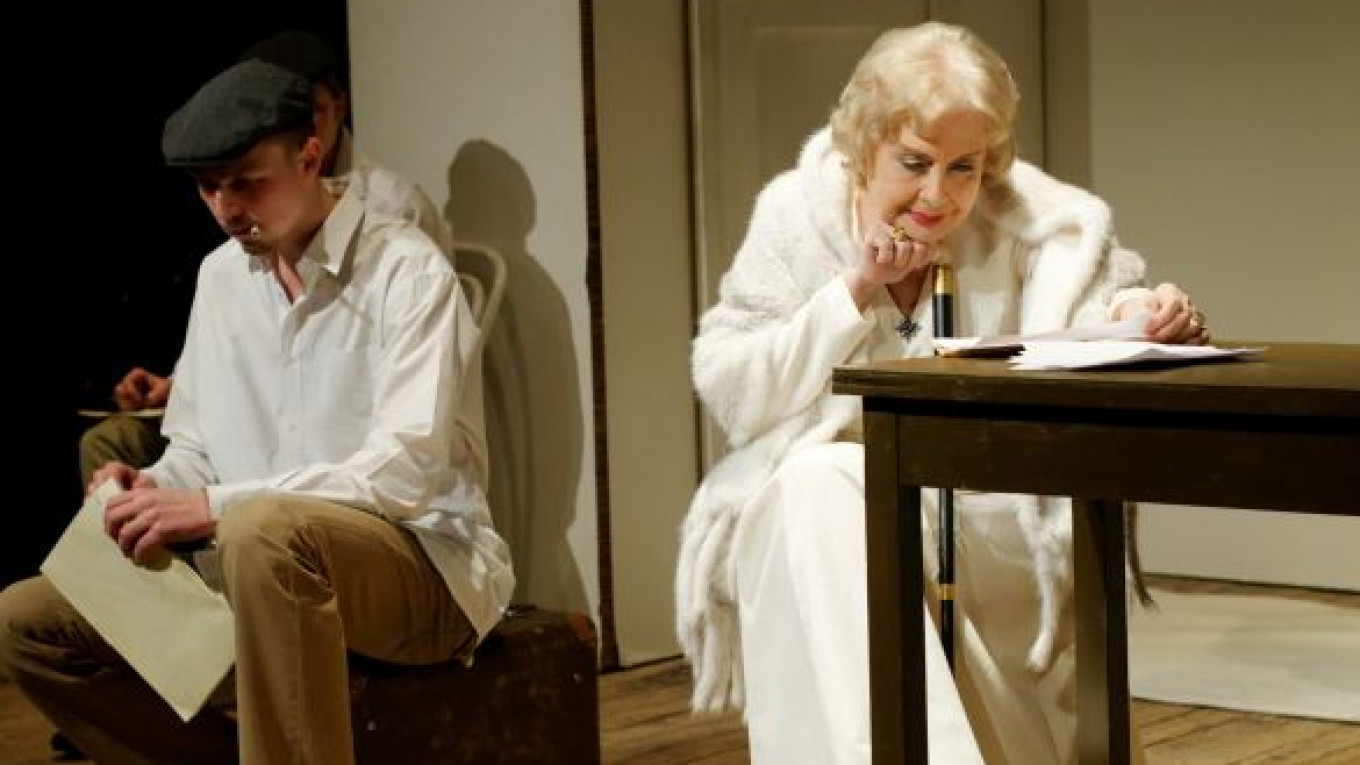"Mayakovsky Goes for Sugar" at the Mayakovsky Theater is small but noteworthy. It is a rare example of an experiment at the feisty, deep-fringe Teatr.doc having a direct impact on the life of an established Moscow playhouse.
A few major theaters have worked with plays, writers or directors coming out of, or, at least, having connections to, the innovative space known affectionately around town as Doc. These include Mikhail Ugarov's "Oblomov" and the Durnenkov brothers' "A Cultural Layer," both of which were staged at the Moscow Art Theater. Ugarov staged his own play "The Newspaper 'Russian Invalid' from July 18" at the Et Cetera Theater. Yelena Gremina's "The Che Brothers" and Mikhail Durnenkov's "I Don't Believe" ran briefly at the Stanislavsky Theater.
"Mayakovsky Goes for Sugar" is different. It is written by the relatively new though already highly respected Sasha Denisova. She burst onto the scene a year ago at Teatr.doc as the author of "Light My Fire." This was a pioneering look at the lives of three iconic rock stars — Jim Morrison, Janis Joplin and Jimi Hendrix — which actually explored rebellious young Russians as much as it did the American musicians.
Denisova's method of drawing something entirely unexpected from well-known biographies was striking in its originality and effect. It bore the distinct signs of innovation, authenticity and authority.
Working with director Alexei Kuzmin-Tarasov, the writer brought a similar approach to "Mayakovsky Goes for Sugar." Here the task was to explore the biography not only of the great Soviet poet Vladimir Mayakovsky, but of his friends and colleagues, including the poet and artist David Burlyuk, the poet Velemir Khlebnikov, the critic Osip Brik and the theorist Viktor Shklovsky.
This show is much more modest than "Light My Fire." Perhaps because it lacks the advantage of irreverently running back and forth across cultural barriers, it looks more like a common biography play. With a few exceptions, the actors here, too, are more traditionally inclined, keeping this show more or less on the customary straight and narrow.
Still, seeing a team of forward-looking artists embraced at one of Moscow's biggest houses — even if it is on the small stage — is undeniably encouraging.
Denisova used the cultural icon of Lilia Brik as a frame for her portrait of Mayakovsky. Wife of critic Osip and, eventually, lover of Mayakovsky, Brik was at the center of Russian literary culture in the second and third decades of the 20th century. She was a frequent subject for poets, photographers, painters and memoirists. Denisova split Brik into two, the older Brik (Galina Anisimova) reminiscing affectionately about her exciting early days, and the younger woman (Maria Fortunatova), who was always in the thick of whatever was going on culturally.
As played by Vladimir Guskov, Mayakovsky is bold, funny and charismatic. It was one of Denisova's goals to create these historical figures in a way that they looked like contemporary young people. This is just the effect Guskov's performance has. He is ironic, quick on the uptake, never taking himself too seriously. You can imagine him hanging out at any of Moscow's coffee shops or subway stations near a university or an institute.
The funniest scenes come earliest: Mayakovsky and Burlyuk offending music lovers as they ridicule Rachmaninov and plan to "throw Pushkin overboard from the boat of modernity"; Mayakovsky visiting the spacey, nearly catatonic Khlebnikov; and Mayakovsky paying his first visit to the Briks, where he proceeds to shock Lilia by ripping up his poems then reciting his soon-to-be-famous "A Cloud in Trousers" in her ear as he almost makes love to her without touching her.
Sergei Bystrov plays a host of Mayakovsky's friends and does a remarkable job of switching seamlessly between characters. His bookish Brik, his unhinged Burlyuk and his introverted Boris Pasternak are nothing like each other, and all are convincing and interesting.
The performance begins with Andrei Stadnikov's short film of a rehearsal, during which the actors discuss Mayakovsky's relevance in light of the coming presidential election and other cultural developments. It then slips into live performance as two so-called emcees (Vsevolod Makarov and Igor Mazepa) begin giving us Wikipedia-like info about the famous poet.
All the action takes place in or around a small white box created by designer Polina Grishina that uses only a portion of the small stage at the Mayakovsky.
"Mayakovsky Goes for Sugar" is a modest achievement arising from a great idea of bringing innovation to an established Moscow theater.
"Mayakovsky Goes for Sugar" (Mayakovsky Idyot za Sakharom) plays Fri. and Feb. 24 at 7 p.m. on the small stage at the Mayakovsky Theater, located at 19/13 Bolshaya Nikitskaya Ulitsa. Metro Arbatskaya. Tel. 690-4658. . Running time: 2 hours, 25 minutes.
A Message from The Moscow Times:
Dear readers,
We are facing unprecedented challenges. Russia's Prosecutor General's Office has designated The Moscow Times as an "undesirable" organization, criminalizing our work and putting our staff at risk of prosecution. This follows our earlier unjust labeling as a "foreign agent."
These actions are direct attempts to silence independent journalism in Russia. The authorities claim our work "discredits the decisions of the Russian leadership." We see things differently: we strive to provide accurate, unbiased reporting on Russia.
We, the journalists of The Moscow Times, refuse to be silenced. But to continue our work, we need your help.
Your support, no matter how small, makes a world of difference. If you can, please support us monthly starting from just $2. It's quick to set up, and every contribution makes a significant impact.
By supporting The Moscow Times, you're defending open, independent journalism in the face of repression. Thank you for standing with us.
Remind me later.







